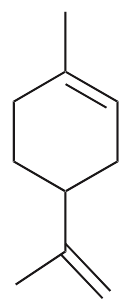Description
D-Limonene is a terpene found in the rind of various species of Citrus. D-Limonene is commercially used as a flavorant, odorant, cleaning solvent, and insecticide; it exhibits anti-inflammatory, antioxidative, hepatoprotective, anti-diabetic, anti-obesity, immunosuppressive, anticancer chemotherapeutic, chemopreventive, anti-metastatic, and anti-angiogenic activities. D-Limonene inhibits cell growth, induces mitochondria-dependent apoptosis, and causes cell cycle arrest in gastric carcinoma cells. In other in vitro models, D-limonene inhibits VEGF, tube formation, and metastasis. Additionally, this compound decreases DMBA-induced tumor formation and tumor burden, potentially through decreasing Ras, Raf, and phosphorylated ERK1/2 levels. In other animal models, D-limonene induces phase II enzyme expression, increasing levels of glutathione; it also decreases levels of KIM-1, Bun, creatinine, NO, iNOS, COX, and NF-κB, limiting doxycycline-induced renal damage. This compound also decreases adipocyte size and levels of blood glucose, LDL, and triglycerides, increases levels of HDL, activates PPARα signaling, and suppresses LXR-β signaling in vivo. D-Limonene inhibits cytokine production by CD4+ and CD8+ T cells and induces T cell death at high doses.
